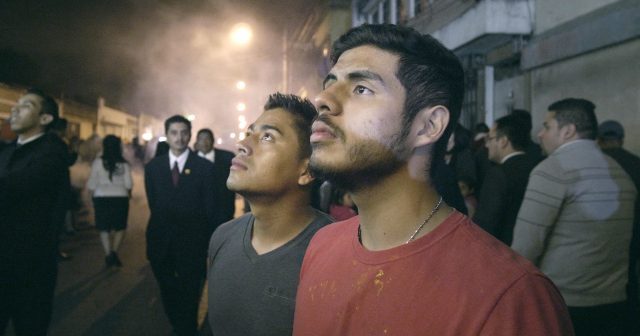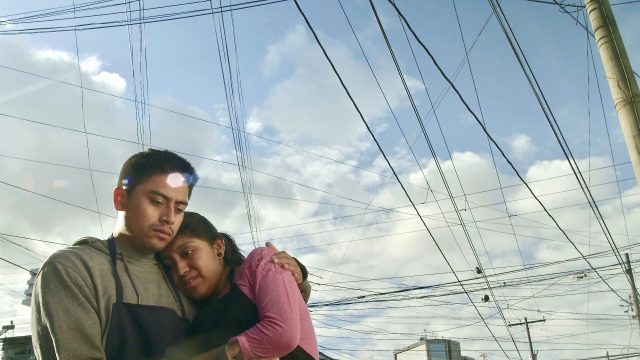
José (Enrique Salanic) and Luis (Manolo Herrera) look to the stars in Queer Lion award winner
JOSÉ (Li Cheng, 2018)
Quad Cinema
34 West 13th St. between Fifth & Sixth Aves.
Opens Friday, January 31
212-255-2243
quadcinema.com/film/jose
www.outsiderpictures.us
At one point in Li Cheng’s gentle, beautifully sensitive José, the title character (Enrique Salanic) is consoling his friend and coworker, Monica (Jhakelyn Waleska Gonzalez), as an airplane passes far off in the distance and José catches a glimpse of it just before it disappears from view. In the very next scene, José is walking determinedly toward the camera as a flock of birds wheels in the sky behind him. The meaning is clear: José is trapped in his situation, unable to fly; he’s barely scraping by at an unfulfilling, low-paying job, taking care of his mother (Ana Cecilia Mota), and unable to live his life in Guatemala — or anywhere else — as a nineteen-year-old gay man out in the open. In a bizarre turn, Salanic has been denied a visa to come to America to support the US theatrical release of the film, which begins January 31 at the Quad. He has traveled all over the world with José, which won the Queer Lion at the seventy-fifth annual Venice Film Festival, but the US embassy explained, “You have not demonstrated that you have the ties that will compel you to return to your home country after your travel to the United States.” The rejection is doubly strange given that Salanic went to school in Missouri and Canada, and, in the film, his character feels like he cannot leave his religious mother to pursue his own hopes and dreams.

José (Enrique Salanic) comforts Monica (Jhakelyn Waleska Gonzalez) in Li Cheng’s José
Gorgeously photographed by cinematographer Paolo Giron with a sharp sense of place and pace and compassionately written by Cheng and fellow producer George F Roberson, the film follows José as he explores first love with Luis (Manolo Herrera). José works at a dobladas restaurant, trying to lure in cars that are driving by a busy corner. He works with Monica and her boyfriend, Carlos (Esteban Lopez Ramirez), carefully overseen by their manager (Cesar Lorenzo Yojcom Candido). José doesn’t say much; he just goes about his daily business, taking walks, riding the bus, and sneaking away to spend time with other men, primarily Luis. There are numerous graphic sex scenes in the film, tinged with both sweetness and sadness. In only his second film and first as a lead, Salanic, who is of Mayan descent, is softly riveting, commanding the camera like a pro.
The plot rings true every step of the way: The film often has a cinéma-vérité feel; all the actors are nonprofessionals, evoking Italian neo-Realism and the work of Hou Hsiao-hsien, using natural light and sound whenever possible. The Chinese-born Cheng and American native Roberson, both of whom have PhDs and previously collaborated on 2014’s Joshua Tree, lived in Guatemala for two years researching and making the film, which they funded themselves; they interviewed hundreds of young people in the twenty largest Latin American cities across twelve countries, asking three main questions: “Which person are you closest to in your life? What’s your most unforgettable memory? Have you been in love?” The result is a film that is a stark portrait of today’s youth in a troubled, difficult world with limited options, whether gay or straight, where refugees are treated like villains and turned away at borders and children are ripped away from their parents. But the film has hope; we have faith that José will ultimately find his path, although the search is likely to be long and arduous. Cheng will be at the Quad for several Q&As January 31 to February 2, moderated by Before Stonewall codirector Robert Rosenberg or NewFest’s Nick McCarthy, but, alas, no Salanic.